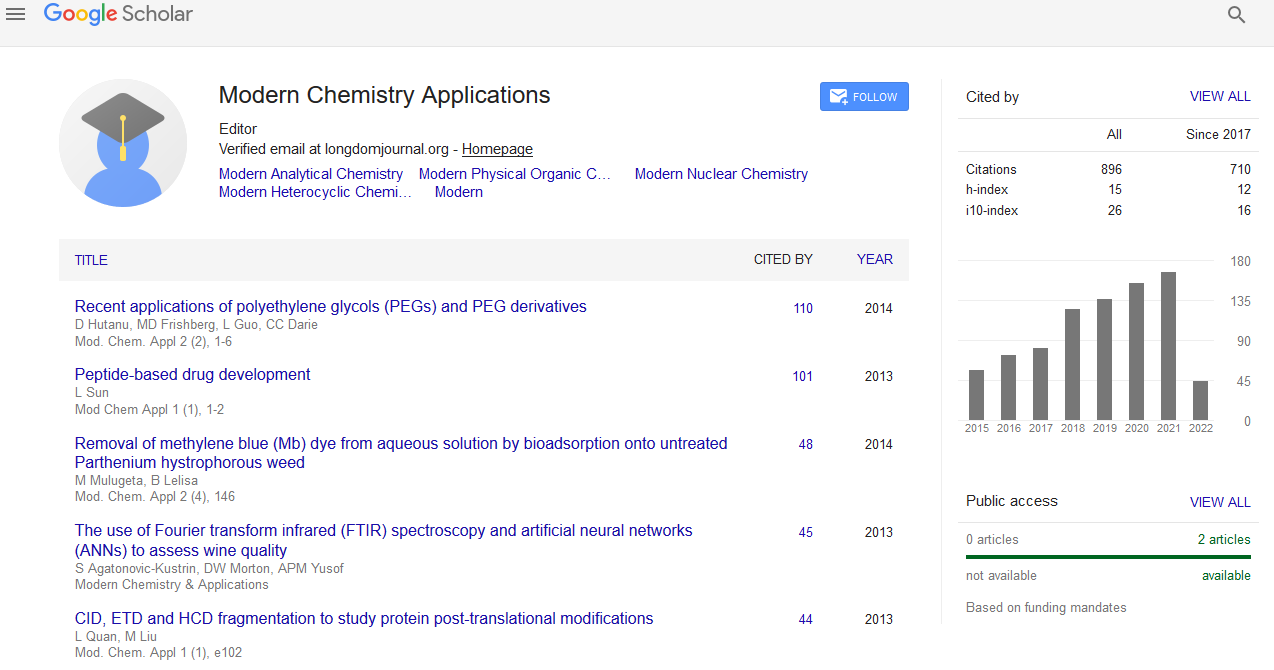Indexed In
- Open J Gate
- JournalTOCs
- RefSeek
- Hamdard University
- EBSCO A-Z
- OCLC- WorldCat
- Scholarsteer
- Publons
- Geneva Foundation for Medical Education and Research
- Google Scholar
Useful Links
Share This Page
Journal Flyer

Open Access Journals
- Agri and Aquaculture
- Biochemistry
- Bioinformatics & Systems Biology
- Business & Management
- Chemistry
- Clinical Sciences
- Engineering
- Food & Nutrition
- General Science
- Genetics & Molecular Biology
- Immunology & Microbiology
- Medical Sciences
- Neuroscience & Psychology
- Nursing & Health Care
- Pharmaceutical Sciences
Opinion Article - (2023) Volume 11, Issue 5
Analyzing Phenolic Compounds: Nature's Antioxidants and their Health Benefits
He Chen*Received: 19-Sep-2023, Manuscript No. MCA-23-23672; Editor assigned: 21-Sep-2023, Pre QC No. MCA-23-23672 (PQ); Reviewed: 06-Oct-2023, QC No. MCA-23-23672; Revised: 13-Oct-2023, Manuscript No. MCA-23-23672 (R); Published: 23-Oct-2023, DOI: 10.35248/2329-6798.23.11.437
Description
Phenolic compounds are a diverse group of organic molecules found abundantly in the plant kingdom. These compounds, which include phenolic acids, flavonoids, tannins, and lignans, are responsible for the vibrant colors, appealing aromas, and many health benefits associated with various fruits, vegetables, and plant-based foods. In this article, we will explore the fascinating world of phenolic compounds, their structure, sources, and the myriad ways in which they benefit human health.
The structure of phenolic compounds
Phenolic compounds are characterized by the presence of one or more phenol rings, which consist of a six-membered carbon ring with an attached hydroxyl group (-OH). This unique structure gives phenolic compounds their distinctive antioxidant properties. Antioxidants play a significant role in protecting cells from oxidative damage caused by harmful free radicals, which are associated with various diseases and aging.
Types of phenolic compounds
Phenolic acids: Phenolic acids are the simplest class of phenolic compounds and are commonly found in foods like coffee, tea, and fruits. Examples include caffeic acid and ferulic acid, which are well-known for their antioxidant properties.
Flavonoids: Flavonoids are a large and diverse group of phenolic compounds found in fruits, vegetables, tea, and red wine. They include quercetin, kaempferol, and catechins. Flavonoids are celebrated for their potential to reduce the risk of chronic diseases due to their antioxidant and anti-inflammatory properties.
Tannins: Tannins are a class of phenolic compounds commonly found in plant-based beverages like tea, red wine, and various fruits. They have astringent properties and contribute to the characteristic taste of these drinks. Tannins have potential health benefits, such as aiding in digestion and promoting heart health.
Lignans: Lignans are found in high-fiber foods such as whole grains, flaxseeds, and legumes. They are known for their potential to reduce the risk of hormone-related cancers and heart disease. Lignans also have antioxidant and anti- inflammatory properties.
Sources of phenolic compounds
Phenolic compounds can be found in a wide range of plant- based foods
Fruits: Apples, berries, citrus fruits, and grapes.
Vegetables: Onions, broccoli, and spinach.
Whole grains: Oats, barley, and quinoa.
Nuts: Almonds, walnuts, and pecans.
Herbs and spices: Cloves, cinnamon, and oregano.
Beverages: Coffee, tea, and red wine.
Health benefits of phenolic compounds
Health benefits of phenolic compounds are:
Antioxidant properties: Phenolic compounds are potent antioxidants that help neutralize free radicals, protecting cells from oxidative stress and reducing the risk of chronic diseases, including cancer and cardiovascular diseases.
Anti-inflammatory effects: Many phenolic compounds have anti-inflammatory properties, which can help alleviate symptoms of inflammatory conditions such as arthritis and may reduce the risk of chronic inflammation-related diseases.
Cardiovascular health: Regular consumption of foods rich in phenolic compounds, such as red wine and dark chocolate, has been associated with improved heart health, including reduced blood pressure and cholesterol levels.
Cancer prevention: Some phenolic compounds, particularly flavonoids and lignans, have shown potential in reducing the risk of certain types of cancer, especially hormone-related cancers like breast and prostate cancer.
Cognitive health: Emerging research suggests that the consumption of phenolic-rich foods may be linked to improved cognitive function and a reduced risk of neurodegenerative diseases like Alzheimer's.
Phenolic compounds are nature's treasures, offering a wealth of health benefits through their antioxidant, anti-inflammatory, and disease-preventive properties. Incorporating a variety of phenolic-rich foods into your diet can be a delicious and effective way to enhance your overall well-being. From fruits and vegetables to herbs, spices, and beverages, phenolic compounds are a testament to the power of plant-based nutrition in promoting a healthier and more vibrant life.
Citation: Chen H (2023) Analyzing Phenolic Compounds: Nature's Antioxidants and their Health Benefits. Modern Chem Appl. 11:437.
Copyright: © 2023 Chen H. This is an open-access article distributed under the terms of the Creative Commons Attribution License, which permits unrestricted use, distribution, and reproduction in any medium, provided the original author and source are credited.


